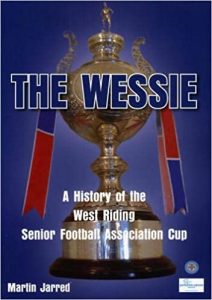Book Review: The Wessie – A History of the West Riding Senior Football Association Cup by Martin Jarred
 The FA Cup is recognised as the oldest cup competition in the World with it first being played during 1871/72, when Wanderers beat the Royal Engineers 1-0 at the Oval in London. It predated the first Football League Championship in England by seventeen years, when Preston North End took the title.
The FA Cup is recognised as the oldest cup competition in the World with it first being played during 1871/72, when Wanderers beat the Royal Engineers 1-0 at the Oval in London. It predated the first Football League Championship in England by seventeen years, when Preston North End took the title.
The point of this brief timeline of English football? Well, simply that cup football came into being before the organisation of league football and perhaps was partly responsible for the special place the FA Cup competition once held within this country. Additionally, it is useful for understanding where the early power of the game was, with The FA coming into existence in 1863, and a number of County FA’s also being founded, for instance, the Sheffield & Hallamshire County FA (1867), Lancashire County FA (1878) and Cumberland FA (1884), before the Football League in 1888.
The West Yorkshire Association came into existence in 1896, due in part to the fact that this part of the country was dominated by the game of rugby. The fledgling organisation launched the West Yorkshire Cup in 1896/97 with Hunslet the winners in the four team competition, which included Bradford, Halifax, and Leeds.
The title of the book, The Wessie, takes its point of reference for the term for people living in the West Riding by those living in other parts of the Broad Acres of Yorkshire. What is immediately evident, is that this has been a real labour of love for its author, Martin Jarred, who came through Prostate Cancer to complete the book, from which half of the author’s royalties go towards Yorkshire Against Cancer in appreciation of the care and treatment he received.
In terms of contents, the book charts the history of the Senior Cup, which in its various guises was played for between 1896 until 1999, details of the County Cup from 2007 to 2019 (when the Senior Cup was presented to the County Cup winners) and a brief overview of key figures in the history of the West Riding County FA.
The amount of research that has gone into this book is staggering, with team-line ups, scorers, attendances, and venues, dating back to that first year of the cup back in 1896/97. It is a book that you will pick-up and put-down and learn something different every time. This includes the early influence of rugby with a number of the grounds used in the early years of the competition, such as Fartown (Huddersfield), Crown Flatt (Dewsbury) and Wheldon Road (Castleford), locations familiar to fans of the thirteen-a-side code. Other points of interest include seeing how players who became household names started off their careers in the Senior Cup such as John Charles, David Seaman, and many of the 60s and 70s renowned Leeds United teams.
The journey through the book is also a journey through the history and development of the game, with clubs going out of existence, in Leeds City and the original Bradford Park Avenue, and the introduction of innovations such as floodlights and substitutes.
However, the most significant factor is that this book is a record of a competition that is unlikely ever to be revived. If the FA Cup is treated with such distain these days, what chances do the County competitions have? The Wessie details how the Senior Cup in West Riding slowly but surely became nothing more than a nuisance in the football calendar, with the senior teams increasingly using it as a chance to blood youngsters or indeed decline to take part altogether and as a result crowds simply did not turn out to see what became games between teams of reserves. The wonderful Fratelli made trophy though at least does still live on, now presented to the County Cup winners, but the irony being that even some of those clubs taking part in recent years (from the National League, Northern Premier League, Northern Counties East League and North West Counties League), use the competition to play their reserves or Academy players and so means that there is little interest from spectators and certainly no financial reward. Will history repeat itself and see another competition consigned to the pages of history?
(Tony Brown. December 2019). Paperback 132pp)